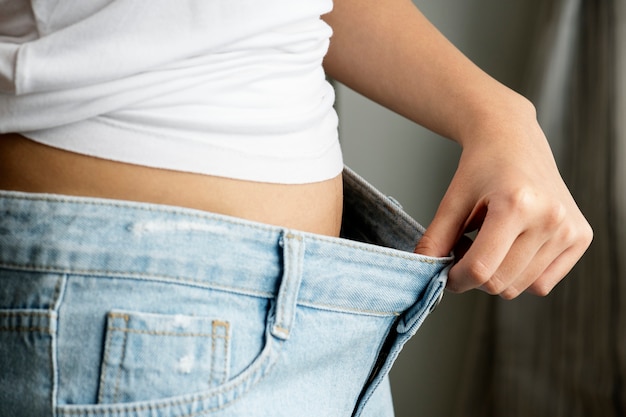
If you’ve been struggling to lose those extra pounds no matter what you try, there could actually be an overlooked solution: probiotics. These “good bacteria,” naturally found in the digestive system, play a surprising role in promoting overall health, including weight loss. Researchers have discovered that probiotics can help reduce body fat by preventing your intestines from absorbing too many fat calories. In fact, a study in the *Journal of Nutrition* linked a specific probiotic strain to fat loss.
### How Do Probiotics Help With Weight Loss?
Probiotics—literally meaning “for life”—support your overall health by influencing how your body digests food. Many people don’t realize that weight issues can stem from an unhealthy digestive system. Studies show that gut bacteria differ drastically between people who are obese and those who are lean. Obese individuals typically have about 20% more “bad bacteria” (known as firmicutes) and 90% less “good bacteria” (bacteroidetes) compared to those with a healthy weight. Firmicutes, in particular, cause the body to extract calories from complex sugars and store them as fat, leading to weight gain.
Probiotics help restore the balance of gut bacteria, especially when your natural bacteria levels are disrupted—this can happen if you’re sick, stressed, taking antibiotics, or traveling. Since 80% of your immune system is located in your gut, maintaining a healthy balance of good bacteria is also essential for proper immune function. Probiotics assist with many bodily processes, including:
– Breaking down and absorbing certain carbohydrates
– Keeping harmful bacteria in check
– Absorbing important minerals, producing vitamins, and eliminating toxins
– Preventing allergies
If your gut has an overgrowth of harmful bacteria, it could lead to low-grade inflammation, making it difficult to lose weight even with a balanced diet and exercise.
### Probiotics and Hormonal Balance
Gut bacteria also influence two key hormones, ghrelin and leptin, which regulate hunger. These hormones can stop functioning properly when the body lacks adequate levels of probiotics. For instance, low levels of probiotics reduce leptin production, increasing hunger and the tendency to overeat. On the other hand, supplementing with probiotics can help regulate these hormones, boosting the body’s fat-burning capabilities and aiding in weight loss.
Studies have even shown that patients who take probiotics after gastric bypass surgery lose more weight—nearly 15% more—than those who don’t. Similarly, women who take probiotics postpartum are likely to lose about 25% more belly fat compared to women who don’t use them.
One specific group of probiotic bacteria, *H. pylori*, interacts directly with ghrelin and leptin to promote weight loss. Unfortunately, the use of antibiotics, common in developed countries, can severely harm gut bacteria, including *H. pylori*. When these bacteria levels drop, leptin production decreases, leading to overeating. By reintroducing healthy probiotics, leptin levels stabilize, improving the body’s ability to lose weight efficiently.
Probiotics are also linked to metabolic health, as they help alleviate metabolic syndrome—a condition closely tied to obesity. This syndrome often results from diets high in sugar and unhealthy fats, which can contribute to insulin resistance, promote unhealthy bacterial growth, and increase body fat.
### What Damages Gut Bacteria?
Gut bacteria are vital for overall health, but they’re sensitive to lifestyle factors. Eating too much processed or junk food harms your gut microbiome by destroying healthy bacteria and feeding yeast and bad bacteria. To maintain a balanced gut, make lifestyle choices that avoid unnecessary antibiotics, antibacterial soaps, chemical-laden foods, pollution, and chlorinated water. Also aim to avoid foods that encourage the growth of harmful bacteria.
### The Best Probiotic Foods for Gut Health
Probiotics come in many forms, including supplements, capsules, tablets, and powders. But one of the best ways to introduce probiotics into your diet is through fermented foods. These natural options are rich in live bacteria that can colonize your gut and promote health. Some probiotic-rich foods to consider include:
– Yogurt or yogurt drinks with live cultures
– Kefir, a fermented milk drink
– Tempeh, fermented soybeans
– Kimchi, sauerkraut, and other fermented vegetables
– Natto, a Japanese dish made from fermented soybeans
Adding these to your diet can help restore and maintain a healthy balance of gut bacteria. If you don’t regularly consume fermented foods or have recently taken antibiotics, high-quality probiotic supplements can provide the boost your gut needs.
### Choosing Probiotic Supplements
If you’re not sure you’re getting enough probiotics from food, supplements like Bifidobacterium and Lactobacillus can help. Experts recommend switching supplements every month or two to maximize effectiveness, but don’t assume that products with a large number of strains are always better. The effectiveness of supplements depends more on the specific microbes they contain than the total count. Whether you choose powders, pills, or liquid shots, finding high-quality options with the right strains is key.
By incorporating probiotics into your daily routine and being mindful of your lifestyle choices, you can not only improve your gut health but also enhance your weight-loss journey.